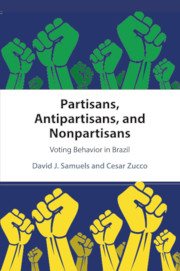Crossref Citations
This Book has been
cited by the following publications. This list is generated based on data provided by Crossref.
Zucco, Cesar
Luna, Juan Pablo
and
Baykal, Gokce O
2016.
Do Conditionalities Increase Support for Government Transfers?.
SSRN Electronic Journal,
Mudde, Cas
and
Rovira Kaltwasser, Cristóbal
2018.
Studying Populism in Comparative Perspective: Reflections on the Contemporary and Future Research Agenda.
Comparative Political Studies,
Vol. 51,
Issue. 13,
p.
1667.
Borges, André
and
Vidigal, Robert
2018.
Do lulismo ao antipetismo? Polarização, partidarismo e voto nas eleições presidenciais brasileiras.
Opinião Pública,
Vol. 24,
Issue. 1,
p.
53.
Spoon, Jae-Jae
and
Kanthak, Kristin
2019.
“He’s not my prime minister!”: negative party identification and satisfaction with democracy.
Journal of Elections, Public Opinion and Parties,
Vol. 29,
Issue. 4,
p.
511.
Santos, Fabiano
and
Tanscheit, Talita
2019.
Quando velhos atores saem de cena: a ascensão da nova direita política no Brasil.
Colombia Internacional,
p.
151.
Wampler, Brian
Sugiyama, Natasha Borges
and
Touchton, Michael
2019.
Democracy at Work.
Rich, Jessica A. J.
2019.
State-Sponsored Activism.
Smith, Amy Erica
2019.
Religion and Brazilian Democracy.
Boas, Taylor C.
Hidalgo, F. Daniel
and
Melo, Marcus André
2019.
Norms versus Action: Why Voters Fail to Sanction Malfeasance in Brazil.
American Journal of Political Science,
Vol. 63,
Issue. 2,
p.
385.
Rennó, Lucio R.
2020.
The Bolsonaro Voter: Issue Positions and Vote Choice in the 2018 Brazilian Presidential Elections.
Latin American Politics and Society,
Vol. 62,
Issue. 4,
p.
1.
OPERTTI, Martín
2020.
Partisanos estoicos. El condicionamiento político de las percepciones económicas en Uruguay.
Revista Latinoamericana de Opinión Pública,
Vol. 9,
Issue. 1,
p.
67.
Civitarese, Jamil
2020.
Social Distancing Under Epistemic Distress.
SSRN Electronic Journal ,
Davis, Stuart
and
Straubhaar, Joe
2020.
ProducingAntipetismo: Media activism and the rise of the radical, nationalist right in contemporary Brazil.
International Communication Gazette,
Vol. 82,
Issue. 1,
p.
82.
Ribeiro, Pedro Floriano
and
Borges, André
2020.
The populist challenge: Multi-level electoral coordination in Brazil’s 2018 elections.
Regional & Federal Studies,
Vol. 30,
Issue. 3,
p.
363.
Cooperman, Alicia
2020.
(Un)Natural Disasters: Distributive Politics in Northeast Brazil.
SSRN Electronic Journal ,
de Paula, Luiz Fernando
Santos, Fabiano
and
Moura, Rafael
2020.
The Developmentalist Project of the PT Governments: An Economic and Political Assessment.
Latin American Perspectives,
Vol. 47,
Issue. 2,
p.
8.
Braga, Maria do Socorro Sousa
and
Apeck, Bruno Wilhelm
2021.
As teorias e o caso.
p.
59.
Mayka, Lindsay
and
Smith, Amy Erica
2021.
Introduction The Grassroots Right in Latin America: Patterns, Causes, and Consequences.
Latin American Politics and Society,
Vol. 63,
Issue. 3,
p.
1.
Pereira, Diogo
and
Roder Figueira, Ariane
2021.
Effects of citizen participation in the social accountability of budget amendments.
The Journal of Legislative Studies,
Vol. 27,
Issue. 1,
p.
30.
Borges Martins da Silva, Mariana
and
Gatto, Malu A. C.
2021.
Stigmatized Campaign Practices and the Gendered Dynamics of Electoral Viability.
Journal of Politics in Latin America,
Vol. 13,
Issue. 3,
p.
376.





